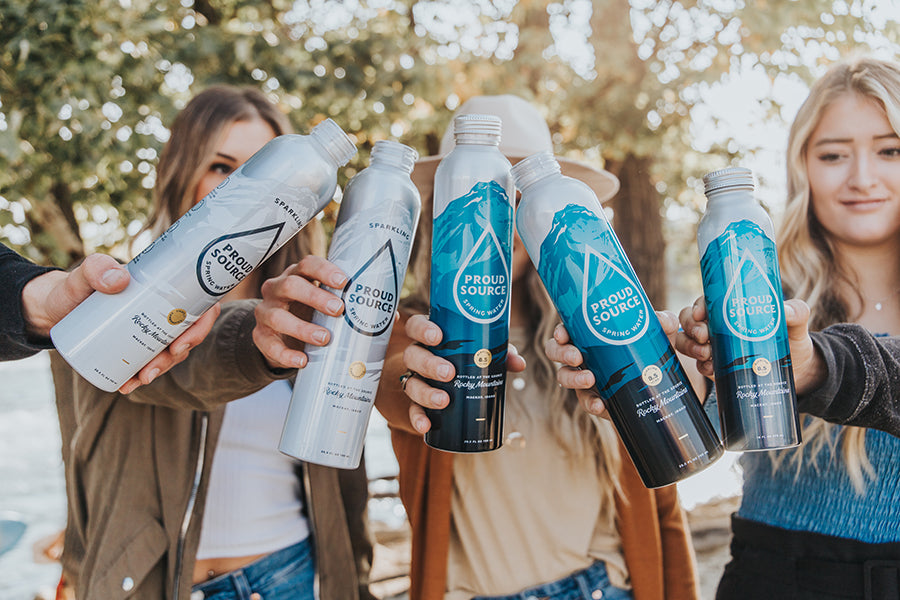At all times, but especially amidst the Coronavirus pandemic, it can be easy to overlook ways to reduce our own plastic footprints through our habits and choices as consumers. At Proud Source Water, we believe in the power and importance of making sustainable choices in our everyday lives, and the positive changes we can make together if we all do our own small part. So, with our friends at the Surfrider Foundation, we’ve compiled some tips for helping you live your best plastic-free life in 2021. Check them out below!
Surfrider Foundation volunteers at a local beach clean up
When you’re on the go:
-
Always bring your reusables— whether you keep them in your car, backpack, or work bag, you can significantly reduce your day-to-day plastic footprint by carrying a reusable bottle or cup for coffee, smoothies, and other beverages! Extend this mindset to cutlery, straws, shopping bags, and produce bags as well, to further reduce your impact. If you forget your reuseables, opt for the most sustainable packaged items (aluminum, glass, compostable, etc.)
-
Ditch single-use plastic zip bags for snacks on the go and storing food at home— instead, opt for refillable jars, stainless steel or glass tupperware, or durable and versatile, food-grade silicone Stasher Bags. (Stashers are also great for protecting your favorite reef-friendly sunscreen and any electronics from sand, dirt and splashes on the beach or trail!)
-
On your next beach, lake, or waterway outing, host your own cleanup to help protect your local coastline or waterway. Whether you gather your household and make an event of it, or just pick up the trash you see along the waterline on your morning walk, your cleanup can help support Surfrider’s policy work. Download a cleanup data card and learn how to report your findings here!
-
If you’re ordering takeout to bring home with you (or for delivery), ask restaurants to leave out any avoidable single-use plastic. This might include skipping a plastic bag for your order, as well as any single-use cutlery, straws or condiment packets.

Plastic straws found at a Surfrider Foundation beach clean up
When you’re at home, or purchasing items for your home:
-
Consider household staples for cleaning and sanitizing that may be contributing to excess plastic in your home, such as spray cleaners, hand soap and dishwashing detergent. Instead of buying a new plastic bottle each time you run out, choose a glass, refillable spray bottle and make your own DIY non-toxic home cleaner, or try purchasing concentrated formulas to refill your bottle, opting for non-plastic packaging wherever possible. (COVID-19 Note: Try the CDC’s recommended DIY cleaner in a glass bottle to limit your plastic use while still providing effective viral protection.) For hand soap, shampoo and conditioner, consider plastic-free, paper-wrapped bars. For dishwashing detergent, look for plastic-free tablets. Toothpaste tubes can be replaced with tablets, and traditional floss can be replaced with glass-packaged, silk floss. Look online for local refill shops or online retailers that sell zero-waste products for even more ideas for sustainable switches.
-
Bringing your own bags to the grocery store is an easy and impactful way to reduce pollution and single-use habits, but try taking your reusable mindset a step further! Try keeping reusable, organic cotton produce bags stored with your grocery totes to help you avoid packaged produce and the single-use plastic produce bags stores typically provide. Consider bulk-buying staple items using mason jars or other reusable containers to avoid packaging waste all together.
-
Craft your own worm compost bin! Not only can worm bins divert food waste, prevent greenhouse gas emissions and give your plants a natural boost, they can even be stored inside if you don’t have a patio or yard. Learn how to create your own here!
-
Microfiber pollution is widespread, pervasive and equally toxic to the environment as the plastics we can see. Choose organic, natural materials over synthetic options for clothing, rugs, sheets and other household items to help reduce your impact. Avoid excessive washing of synthetic materials, which causes microfibers to shed into the wastewater stream, make their way through treatment facilities, and ultimately pollute our ocean, waterways and even drinking water sources.
-
Support your local farmers market to find fresher, locally-grown produce and locally-made, small-batch goods, and don’t forget to bring your own bags! Buying at farmers markets tends to support more sustainable production practices, eliminate or significantly reduce single-use packaging, and may be possible to get to without motorized transportation.

Surfrider Foundation community at beach clean up
Interested in trying Proud and giving back to the environment? Use code-
surfriderproud at checkout for 15% off any online order.




